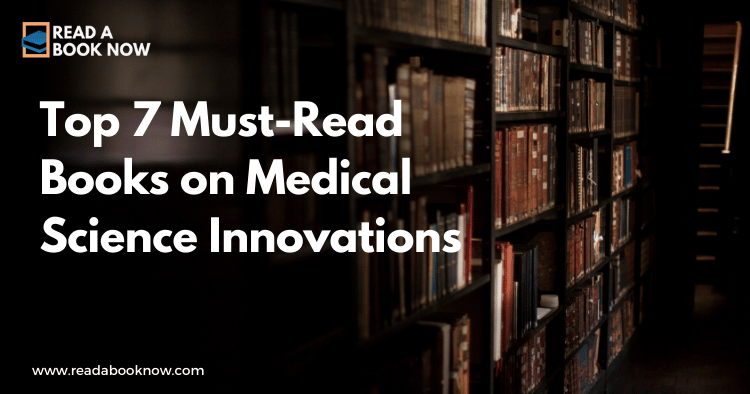Table of Contents
- Introduction
- 1. The Emperor of All Maladies: A Biography of Cancer by Siddhartha Mukherjee
- 2. Medical Apartheid: The Dark History of Medical Experimentation on Black Americans from Colonial Times to the Present by Harriet A. Washington
- 3. The Gene: An Intimate History by Siddhartha Mukherjee
- 4. The Future of Medicine: Megatrends in Healthcare by Stephen C. Schimpff
- 5. When Breath Becomes Air by Paul Kalanithi
- 6. Being Mortal: Medicine and What Matters in the End by Atul Gawande
- 7. The Innovator’s Prescription: A Disruptive Solution for Health Care by Clayton M. Christensen
- Conclusion
- FAQs
Introduction
In the ever-evolving field of medical science, staying informed about innovations and historical contexts is crucial for both professionals and enthusiasts. Books provide an excellent avenue for deepening our understanding of medical advancements, ethical challenges, and human stories behind the science. Below, we outline seven must-read books that illuminate the fascinating world of medical science innovations.
1. The Emperor of All Maladies: A Biography of Cancer by Siddhartha Mukherjee
Siddhartha Mukherjee’s Pulitzer Prize-winning book is often referred to as a “biography of cancer.” This comprehensive narrative not only traces the history of cancer but also details the scientific and personal stories of those affected by this disease. Mukherjee explores the evolution of cancer treatments from ancient civilizations to modern-day therapies, making it an essential read for anyone interested in the ongoing battle against cancer.
Key Highlights:
- Historical Context: Understand how cancer was perceived in different eras.
- Innovative Treatments: Learn about groundbreaking therapies such as immunotherapy and targeted treatments.
- Personal Stories: Mukherjee weaves in poignant anecdotes that bring the statistics to life.
“A thorough understanding of cancer is essential not just for medical professionals, but for society as a whole.”
Read more about Mukherjee’s work here.
2. Medical Apartheid: The Dark History of Medical Experimentation on Black Americans from Colonial Times to the Present by Harriet A. Washington
Harriet A. Washington’s seminal work delves into the troubling history of medical experimentation on African Americans. This book serves as a crucial reminder of the ethical considerations that must shape medical innovations. It provides a comprehensive examination of how systemic racism has influenced medical research and public health policies.
Key Highlights:
- Historical Overview: Chronicles significant events in medical history that affected Black Americans.
- Ethical Implications: Discusses the implications of past abuses on current medical practices.
- Call to Action: Encourages readers to advocate for equitable healthcare solutions.
“Remembering the past is crucial for building a more equitable future in healthcare.”
For further reading on medical ethics and the historical context, consider looking at resources on postcolonial literature.
3. The Gene: An Intimate History by Siddhartha Mukherjee
Another masterpiece by Siddhartha Mukherjee, “The Gene” is an accessible yet profound exploration of genetics and its implications in medicine. The book discusses the complex interplay between genetics and environment, offering insights into how our understanding of genes is reshaping the future of medicine.
Key Highlights:
- Genetic Revolution: Covers the history and discovery of DNA.
- Personal Narratives: Highlights stories of families affected by genetic disorders.
- Future Prospects: Explores the ethical dimensions of genetic engineering and CRISPR technology.
“Understanding genetics is not just about science; it’s about the very essence of who we are.”
Discover more about genetics at the National Human Genome Research Institute.
4. The Future of Medicine: Megatrends in Healthcare by Stephen C. Schimpff
In “The Future of Medicine,” Stephen C. Schimpff discusses the transformative megatrends shaping healthcare, including telemedicine, personalized medicine, and the impact of technology on patient care. This book is a must-read for those interested in how innovation is redefining the healthcare landscape.
Key Highlights:
- Technological Impact: Insights into how AI and machine learning are revolutionizing diagnostics and treatment.
- Patient-Centric Care: Emphasizes the shift towards personalized medicine and patient engagement.
- Global Perspectives: Discusses how healthcare trends vary across different countries.
“Innovation in healthcare is not just a trend; it’s a necessity for improving patient outcomes.”
Learn more about healthcare innovations at the World Health Organization’s website.
5. When Breath Becomes Air by Paul Kalanithi
This poignant memoir by neurosurgeon Paul Kalanithi explores the intersection of life, death, and medicine. Diagnosed with terminal lung cancer, Kalanithi reflects on his journey as both a doctor and a patient, providing invaluable insights into the human side of medical science.
Key Highlights:
- Personal Reflection: A moving account of Kalanithi’s experiences navigating his diagnosis.
- Philosophical Insights: Explores profound questions about the meaning of life and the role of medicine.
- Human Connection: Highlights the importance of empathy in patient care.
“True healing involves more than just addressing physical ailments; it requires understanding the human experience.”
For more insights on patient care, check out the American Academy of Family Physicians.
6. Being Mortal: Medicine and What Matters in the End by Atul Gawande
Atul Gawande’s exploration of aging and end-of-life care challenges traditional notions of what it means to provide good care. He argues for a more humane approach to medicine that prioritizes the quality of life, making this book a vital read for healthcare professionals and caregivers alike.
Key Highlights:
- Quality of Life: Discusses the importance of aligning medical care with patients’ values and preferences.
- Case Studies: Provides real-life examples of patients facing difficult decisions.
- Guidance for Caregivers: Offers practical advice for supporting loved ones in their final stages of life.
“At the end of life, what matters most is not the quantity of life, but the quality of it.”
Read more about Gawande’s work on his website.
7. The Innovator’s Prescription: A Disruptive Solution for Health Care by Clayton M. Christensen
Clayton M. Christensen’s “The Innovator’s Prescription” presents a framework for transforming healthcare systems through innovation. By applying principles of disruptive innovation, Christensen suggests ways to improve patient care while reducing costs.
Key Highlights:
- Disruptive Innovation: Explains how new technologies can significantly alter healthcare delivery.
- Practical Solutions: Offers actionable strategies for healthcare providers and policymakers.
- Future Outlook: Discusses the potential of telehealth and digital solutions.
“Innovation is key to overcoming the challenges in healthcare and ensuring better patient outcomes.”
For further exploration of innovation in healthcare, visit the Harvard Business Review.
Conclusion
These seven books provide a rich tapestry of insights into medical science innovations, blending history, ethics, and personal narratives. Whether you’re a healthcare professional, student, or simply a curious reader, these titles will deepen your understanding of the complexities and advancements within the medical field.
FAQs
1. Why are these books important for understanding medical science?
These books offer diverse perspectives on medical innovations, ethical dilemmas, and historical contexts, helping readers grasp the complexities of healthcare.
2. Can these books benefit healthcare professionals?
Absolutely! They provide valuable insights into patient care, innovative practices, and the historical context of modern medicine.
3. Where can I find these books?
Most of these titles are available at major bookstores, online retailers like Amazon, or your local library.
4. Are there any audiobooks available for these titles?
Yes, many of these books are available in audiobook format, making them convenient for on-the-go learning.
5. How can I stay updated on medical science innovations?
Follow reputable medical journals, subscribe to newsletters from healthcare organizations, and consider joining relevant online courses or webinars.
By diving into these must-read books, you’ll enhance your knowledge and appreciation for the innovations that




